10 Ways to Effectively Write Content & Use Keywords for SEO
Digital Hill Multimedia, Inc.
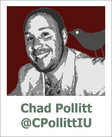
10 Effective Steps for On-Page SEO
Always keep in mind the number one rule of SEO: Whatever you do on your website you do it for the user first. The biggest mistake I see people make when executing any type of SEO strategy is to “skirt” the system.
If you follow the ten simple steps below Google will have a clear understanding of what your website is all about. Whether or not Google defines you as “most relevant” (#1) is truly up to you. If you write high quality content and follow the rules below you will have one third of the SEO equation solved (Programming, Keywords, Backlinks).
1. Choosing the right keywords for SEO
When Search Engines spider the content of your website they ascertain a lot of information. When they are done they determine a “theme” for every individual page and an overall “theme” for your website. This is important to know because search engines define your theme based on the individual words and word combinations on the each page. They also look at backlinks, but that is another article. Self-defining these themes is called on-page SEO.
So, in order to plan a successful SEO strategy a Site Map and Keyword Workshop should be done before any development takes place. There are dozens of free keyword tools out there on the web, but I recommend Google Keyword Tool for SEO research.
Once you have done your Keyword Workshop and Site Map identify a primary and secondary keyword phrase for every page. You can have more, however you run the risk of over saturating your page and Google assigning an incorrect theme to that page or overall website. Here is an example for an internal eCommerce page of Web Design Fort Wayne.
Primary: eCommerce
Secondary: Web Design Fort Wayne
The primary keyword phrase should be different for every page. However, your secondary keyword phrase on all internal pages should be the primary keyword phrase for your home page. Your company name should never be a primary keyword phrase. If someone is looking for your company online they will find you. Below is an example from Google Webmaster Tools showing what Google believes is the overall SEO theme for Web Design Fort Wayne.
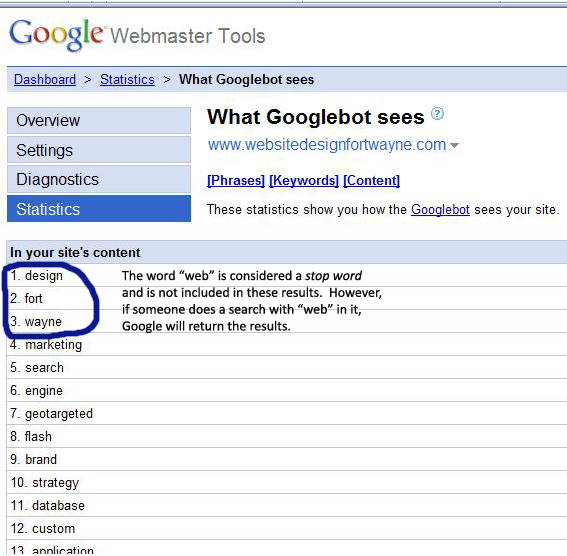
2. Every page should have over 250 words and less than 1000 words for effective SEO. If you find that you need more than 1000 words for a page then consider creating subpages to break up the content. Any words over 1000 Google does not index, but ignores.
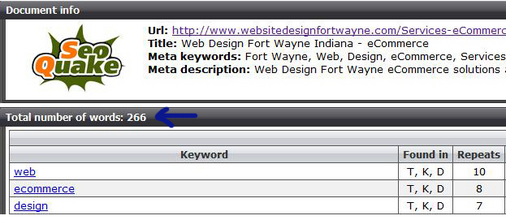
3. Your primary keyword phrase should be in the first line of your content, the middle of your content and the last line of your content for SEO.
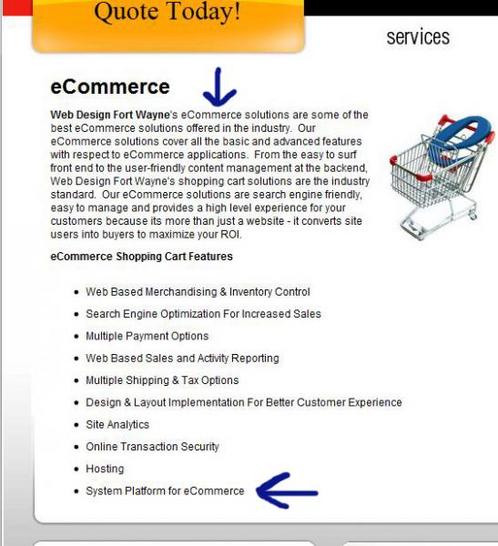
4. Also, you want your keyword phrase to show up at a 3 – 7% saturation ratio for each page for SEO. I recommend downloading SEO Quake. Once you have it installed, just click the density link on the menu and it will give you a report similar to the below example.
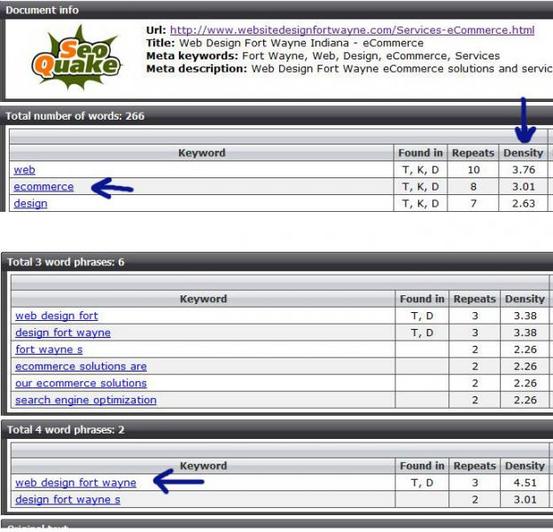
5. Include one Heading 1 Tag with your primary keyword phrase on each page above the pages content. The word eCommerce is the primary keyword phrase that has the H1 Tag. It’s a bigger font, bolded above the content and is important for SEO.
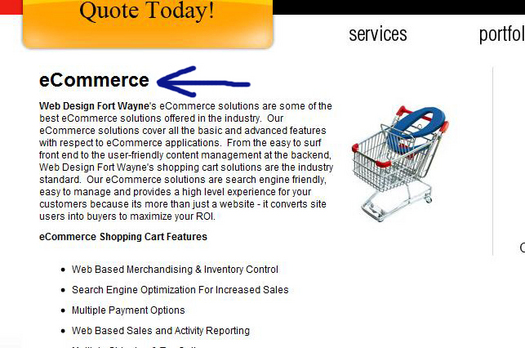
6. Make sure your page titles are keyword rich and every page has a different page title for SEO. Google will “punish” you if you have identical page titles. See Optimizing Page Titles for SEO. In addition, don’t use words that do not matter for searches (ie. a, an, the, Home Page, my, your, best, overview, industry, etc.). This will negatively effect your SEO. Here’s an example:
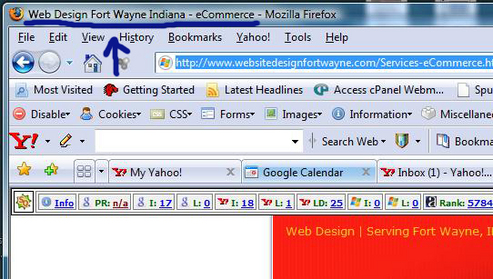
7. Put your primary keyword phrase on pictures using alt text. It’s the words that pop up when you hover over an image with your mouse. These keywords become even more relevant to Google when you place the image in close proximity to the actual keyword in your content for SEO. Warning: Do not “Keyword Stuff.” Make sure that the words are relevant to your content and the image.

8. Meta Tags
Meta Tags are helpful but not the end all. Reports say that Google does use the keyword meta tag for ranking as they used to due to the tag being abused by “stuffers” in the past. However, other search engines use them and should you choose not to include them or have identical Meta Tags you can have your SEO efforts dinged. They can be similar but should be unique per page! Having said that…here’s a loose list of things to remember:
- Limit Keyword list to no more than 20 targeted phrases of two or more words.
- Separate using comma with no spaces.
- Avoid repeating keywords more than 3-7 times
- Repetition up to 3 times is ok, just don’t place them one after the other.
- Limit it to 1024 characters. List keywords in order of importance. Don’t repeat the same keyword more than 7 times.

9. Meta Description
Limit your Meta Description to 65 – 150 character spaces.
Google wants the Meta Description to accurately represent the web result. They frequently prefer to display meta descriptions of pages (when available) because it gives users a clear idea of the URL’s content. This directs them to good results faster and reduces the click-and-backtrack behavior that frustrates visitors and inflates web traffic metrics. Keep in mind that meta descriptions comprised of long strings of keywords don’t achieve this goal and are less likely to be displayed in place of a regular, non-meta description, snippet. And it’s worth noting that while accurate meta descriptions can improve click through, they won’t affect your ranking within search results for SEO. See the snippet below.

10. Bolding
Some keywords can be bolded to point the search engines in the right direction for SEO. When you are writing your web content you will probably want to stress a certain word or two. Bolding a word to make it stand out doesn’t carry the same weight with search engines like a Heading tag would. Don’t discount it though, because it does matter.
Any time you stress a word and make it stand out you are also stressing that word to the search engines. Using Bold Text should be done only when it fits into the flow of your content. Over bolding your content can detract from the overall look of your website, make users think you’re yelling at them and have a negative effect on your SEO.
